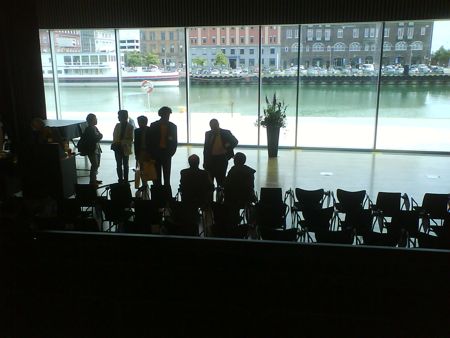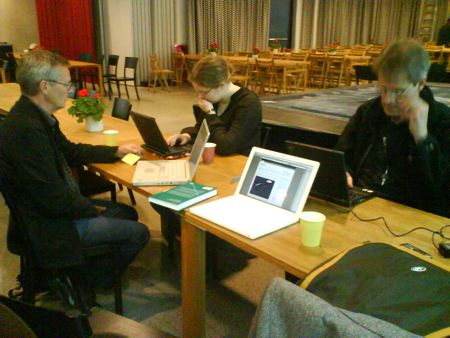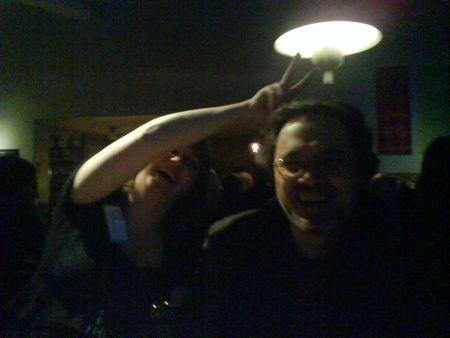Det är kul att vara på konferens. Tröttande, ibland, men kul. Vårterminens konferensande för mig har inneburit tre intressanta konferenser – Teknik- och vetenskapshistoriska dagar i Stockholm; Historikermötet i Lund; och PCST-10, Malmö/Köpehamn som jag är på just nu.
Sitter och skriver just i detta nu på en session (frågestund pågår, Thomas kritiserade alldeles nyss framgångsrikt en kvantitativ analys – go Thomas!).
Har precis presenterat vår – vi är Malin Sandström, Thomas Söderqvist och undertecknad – session om vetenskap på nätet; många besökare dök upp och ställde intressanta frågor.
Här är våra abstract:
Malin Sandström, ”Beyond the ’cool stuff’: science blogging as a democratic tool”
Traditionally, media’s reporting of non-medical science rests on a small subset of articles published in a few of the major journals; with a heavy emphasis on the “cool stuff” and often also framed in a way which is poorly adapted to science reporting. The common use of the scientist as an aloof, impersonal expert does little to foster interaction between the scientific world and the public. In contrast, blogging leaves the choice in the hands of the blogger – blogging researchers can decide for themselves what to say, how and when. The blog by its nature is personal and interactive, making it a convenient and attractive platform for contact between scientists and laymen.
Outside of the scientific world, access to published research is very limited: few persons have the expensive journal subscriptions and superior grasp of specialist English required. Scientists blogging in
their native language can do much to alleviate this gap. Furthermore, science blogging – especially interactions between science bloggers – can incorporate and spread other underreported fundamentals of the research process, such as patterns of reasoning and how to judge the validity of results.
Thomas Söderqvist, ”Science blogging between Empire and Multitude”
Within a few years, science blogging has emerged as a new genre for science communication. But is science blogging really best understood in terms of ’science’ and ‘the public’? Or does the phenomenon of science blogging suggest other dichotomies? This paper argues that ’science communication’ is better conceptualized in terms of ‘Empire’ and ‘Multitude’. Science is financed and managed by a network of national and transnational state organisations and corporations, while the overwhelming number of laboratory and field workers constitute a global knowledge proletariat. These different positions in the global ’scientific field’ entail two different domains of communication practices which correspond, roughly, to the cultures of ‘Empire’ and ‘Multitude’, respectively.
Gustav Holmberg, ”CPU cycles and citizens: A study of the distributed computing communities Seti@home and Folding@home”
Computer simulation and large-scale data analysis used to be the province of scientists proper. Distributed computing is a kind of public engagement with science that involves large numbers of participants. The worldwide user-base of citizens interested in donating computer power to protein science and bioastronomy are modern examples of the mutual interaction between scientists and nonscientists. This paper will look into questions such as why people decide to collaborate in the distributed computing projects and analyze the discourse surrounding bioastronomy and proteomics. It will look at how ideas about protein dynamics and bioastronomy are articulated through various participatory platforms: weblogs, computer fora, wikis, YouTube videos and the Folding@home software. The paper also analyses the flow of skills from subsets of the user pool into the core of the distributed computing project, suggesting that a group of users have knowledge about the intricacies of software technologies that have been useful in the evolution of the Folding@home project.
Vi har – förstås! – en nätnärvaro. Här finns Malins kommentarer efter sessionen.
Update 30 juni: Agence Science Presse uppmärksammar vår session.

Folk vill prata med Larry Sanger efter hans keynote igår.

Efter vår session: vi sitter och bloggar, här tillsammans med Peter Sylwan.

En bild från tidigare konferens i våras: Pernilla Karlsson, utforskare av gamerkulturer och Mats Fridlund, utforskare av terrorismens teknikhistoria, på Teknik- och vetenskapshistoriska dagar 2008.

Pingback: Det perfekta tomrummet › Galaxy zoo